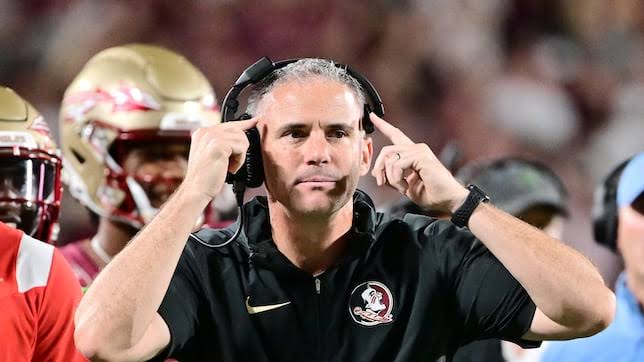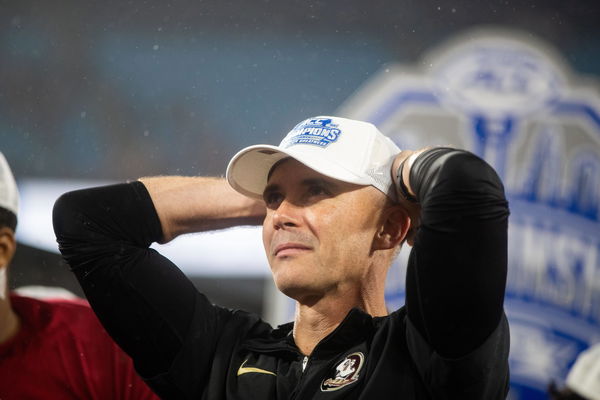

Florida State football has never shied away from controversy, but this time, they are making headlines with their fine print. With the dawn of the revenue-sharing era in college athletics following the House v. NCAA settlement, FSU has taken one of the most aggressive approaches to player contracts in the country. They have decided to fully spend the $20.5 million cap, but instead of waiting for the standard practices like many SEC and Big Ten programs, the Seminoles have written their own rules, tying compensation to playing time, injuries, and even disciplinary discretion. And now, the college football world is asking: Have they gone too far? Well, yes, they have.
Watch What’s Trending Now!
These contracts reportedly include clauses that reduce a player’s pay if their playing time drops, even due to injury, and even include a $2,500 fine for losing team equipment. Perhaps the most concerning detail? Players cannot challenge these decisions in court and must go through arbitration, where the school’s general counsel represents the university. The administration can also extend a player’s contract at any time without consent.
And analysts aren’t blind to the gamble. Bud Elliot broke it down for the laymen. “It’s kind of a one-shot thing. From an organizational standpoint, you get tremendous value if some of these kids actually sign this, right? Which you shouldn’t, at least without redlining it. And the guys who have real leverage and are really, really good will redline the h— out of it and won’t sign it—and the school will probably cave.” He added that Florida State’s strategy is more about testing the limits before regulation kicks in. “I don’t think you can do it two cycles in a row,” he said. “I think it’s a one-time thing.”
ADVERTISEMENT

ADVERTISEMENT
Bud continued echoing the sentiment, suggesting FSU knows exactly what they’re doing. “Okay, all right, cool. We’ll take a little PR hit… but guess what? What are you gonna do? Sit out here and transfer, three-star?” And there’s the context behind their caution. Chip Patterson pointed out, “We spent all this money last season, and it bit us. So sorry if we’re going to be a little more protective this go-round.” In short, FSU sees this model as a shield after burning through NIL dollars without guaranteed results.
The concern, though, runs deeper than one school’s behavior. These types of contract clauses raise troubling questions about due process and player rights. If an athlete can be cut for “alleged” misconduct without legal recourse or if they’re financially penalized for injuries sustained in one of the most physical sports on earth, then the sport’s foundational agreements are on shaky ground.
ADVERTISEMENT
FSU may see itself as a pioneer in a rapidly changing system, but it also risks isolating elite recruits and stirring backlash within the coaching community. As one agent reportedly put it, “I don’t think Florida State is the worst at all in this business. There are schools I trust less.” But the fact that these models are even being tested is a warning sign that, without proper oversight, the new NIL world could spiral into a murky gray zone where only those with the deepest legal teams and thorniest contracts win.
A dangerous precedent
For decades, college football operated on the principle that players traded performance for exposure and a shot at the next level. But with NIL and revenue sharing entering the picture, the dynamics are shifting, and Florida State’s rewritten rules have even veterans of the game stunned.
ADVERTISEMENT
Top Stories
Scottie Scheffler Faces Scrutiny After Taking Out Anger on Golf Club at WM Phoenix Open: ‘Washed’

Jordan Spieth Throws Bizarre Temper Tantrum as Opening Round at WM Phoenix Open Becomes a Challenge

Rob Gronkowski Demands Severe Punishment for Andy Reid After Bill Belichick Snub

PGA Tour Split Into Two as Scottie Scheffler Confirms Stance on Patrick Reed’s Return

Multiple PGA Tour Pros Stopped from Playing as WM Phoenix Open Round Is Canceled Over Recurring Problem

Drake Maye Reveals Shoulder Injury Update as Patriots QB Announces News On Super Bowl Availability

Here’s what former Florida Gators head coach Urban Meyer said. On The Triple Option podcast, Meyer asked a question that every high school recruit and parent should now be thinking. “If you lose a pair of shoes, it’s going to cost you possibly $2,500. And if you get hurt in one of the most violent sports and tough sports out there, you’re going to be in breach of contract. What’s the response, Mark?” Mark Ingram II, Heisman Trophy winner and co-host, delivered a sobering response. “Coach, just give me a copy of that, and, I’mma gonna talk to you later… Say I have an amazing Heisman season. We won a national championship, and I outplayed my value, right? They can extend me without my consent. So, now I’m getting underpaid.”
The core concern isn’t just that these contracts exist, but that their clauses, ranging from financial penalties for injuries to unilateral term extensions, strip athletes of rights most working adults would consider non-negotiable. Ingram’s example highlights how a player’s peak performance could paradoxically hurt his future value if he’s locked into a rigid, school-controlled deal. And as Meyer warned, this could severely damage a program’s pitch in the living rooms of recruits across the country. Bud Elliot said Florida State will take a tiny hit on its PR. One thing we know is that the hit sure won’t be tiny at all.
ADVERTISEMENT
ADVERTISEMENT
ADVERTISEMENT
ADVERTISEMENT
.png)
.png)
.png)



